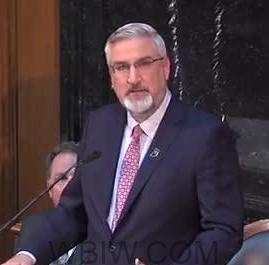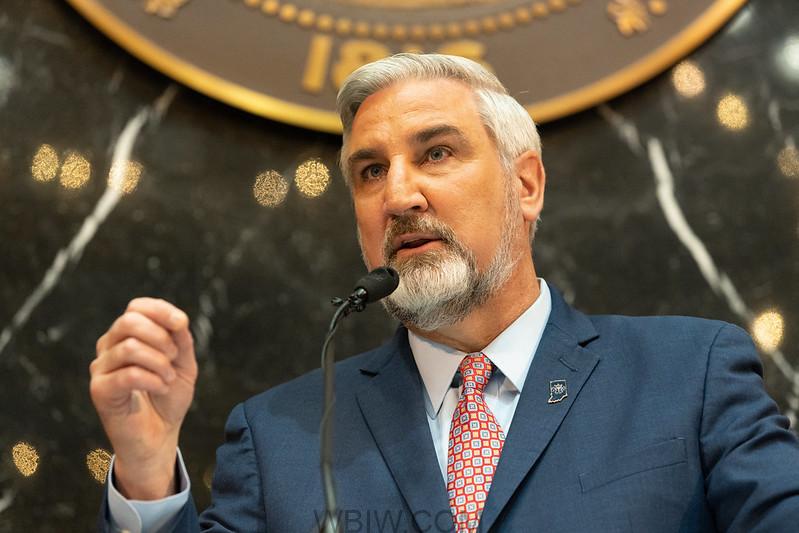
INDIANAPOLIS – Governor Eric J. Holcomb unveiled his 2024 agenda at the Indiana School for the Blind and Visually Impaired. The governor focused on work that will continue this year because of an incredibly successful 2023 budget session and new administrative and legislative items that build on major progress already made in key priority areas such as childcare, education, and workforce.
To showcase resources and programs Indiana has built for individuals, businesses, and communities across the state, the governor unveiled the Hoosier Playbook – a place-making resource guide for local leaders and partners.

“The Hoosier Playbook will assist local leaders with state resources to strengthen their communities. From health and wellness initiatives to education and training to cultural amenities and placemaking tools, with our cities, towns, and counties as they work to develop in their unique ways,” Gov. Holcomb said. “This Administration and this year’s agenda approaches the work ahead as an all-hands-on-deck effort to connect Hoosiers with the assistance they need and when they need it the most.”
New administrative and legislative initiatives on Governor Holcomb’s 2024 agenda will continue his efforts to increase early childhood education access, affordability, and expansion and take additional steps to bolster K-12 literacy efforts. Among other priorities, the governor said he will work directly with local communities help them prepare and recover from natural disasters, and he announced the One Start to Stop campaign, an effort to connect Hoosiers with a single source to lead them to education, training and jobs programs and services.
The 2024 Next Level Agenda contains legislative and administrative priorities in five categories.
Education
The governor has prioritized education at all levels and will pursue proposals that further strengthen early childhood, K-12 schools, and higher education.
Early Childhood
The governor will work with the legislature and administratively to expand the supply and sustainability of childcare and early childhood education providers by better attracting, retaining, and training the workforce, empowering employer-sponsored options, and continuing systemic regulatory reforms. Specifically, the governor seeks to:
- Strengthen the workforce pipeline by administratively adding early childhood education credential training to the state’s Workforce Ready Grant and Employer Training Grant programs.
- Reduce the minimum caregiver age for infant and toddler rooms from 21 to 18 for certain individuals, with appropriate training, parental notice, and requirements for child safety.
- Lower the minimum supervised caregiver age for school-age classrooms from 18 to 16 for certain individuals, with appropriate training, parental notice, and requirements for child safety.
- Expand the pool of early childhood educators and support workforce needs by allowing qualified individuals working in other fields, such as K-12 teachers, to register as ‘substitute educators’.
- Inform ongoing efforts to improve salaries for early childhood educators by conducting a statewide employee compensation study.
- Launch the second phase of Governor Holcomb’s Employer-Sponsored Child Care Fund by awarding the remaining $6.9 million to assist employers and communities in expanding child care options. The first $18 million was announced in December 2023.
- Create a new eligibility category for the On My Way Pre-K Program and Child Care and Development Fund (CCDF) vouchers for the employees of licensed childcare entities, providing free or reduced-cost child care to members of this critical workforce who earn up to 85 percent of the state’s median income.
- Continue administrative and regulatory reforms to increase the number of high-quality childcare providers by considering recommendations from the Early Learning Advisory Committee and allowing more K-12 public schools to qualify as eligible providers for the On My Way Pre-K Program.
K-12
Gov. Holcomb will continue his commitment toward reaching the state goal of 95% of third graders reading proficiently by 2027. Over the last two years, the governor announced several reading initiatives, including a monumental investment by the Lilly Endowment to prepare educators to teach the science of reading. This year, the focus is on providing early intervention tools and resources to assist students and educators with reading efforts. Among the governor’s proposals are:
- Requiring schools to administer IREAD in second grade and to offer summer school reading programs to students in second grade who are not on track for reading proficiency and third graders who did not pass.
- Continuing to test students who have not passed IREAD through sixth grade or until they demonstrate reading proficiency.
- Strengthening retention efforts for students who have not passed IREAD in third grade.
The governor will ensure the state’s 2023 promise that free public education, including free curricular materials, is implemented statewide by requiring schools to annually report to IDOE any student fees charged to families, regardless of type, and the data will be posted online.
The governor will establish a computer science course requirement for high school graduation beginning in 2029 to better equip Hoosier students with the digital skills to enter the mid-twenty-first century workforce.
Higher Education
Gov. Holcomb will propose three ways to accelerate and increase post-secondary student achievement. The governor will do the following:
- Pursue legislation to require state universities to review bachelor’s degree programs for the feasibility of providing structured three-year degree programs.
- Propose that all public four-year institutions carefully consider, on a campus-by-campus basis, awarding earned associate degrees (at least 70 eligible credit hours) to eligible current and former “stopped out” students.
- Establish a statewide ‘reverse transfer’ system that proactively identifies former community college students who transferred to a four-year state educational institution eligible for an earned associate degree (at least 60 eligible credit hours) as current or former “stopped out” students.
Economic and Workforce Development
Gov. Holcomb will continue his work toward connecting Hoosiers with the jobs of the future by announcing the creation of the “One Stop to Start” workforce hub that will:
- Offer real-time support and one-on-one navigation that connects Hoosiers and employers to workforce, education, and training programs that meet their needs and set them up for future success.
- Promote awareness and access to the state’s workforce education and training programs, including Next Level Jobs and other resources.
Community Development
Gov. Holcomb will work with legislators to make it easier for communities to prepare and recover from disasters by doing the following:
- Streamline how the State Disaster Relief Fund (SDRF) can be used to ensure more disaster-related expenses are eligible.
- Allow a portion of the SDRF to be awarded for disaster mitigation programs to protect against future damage.
- Simplify the public assistance grant formula for easier access when needed.
- Increase the maximum potential award for individual assistance from $10,000 to $25,000.
- Provide Hoosiers flexibility when applying for assistance by removing the requirement that individual aid can only be used when the United States Small Business Administration declares a disaster.
- Incentivize counties to prepare hazard mitigation plans by increasing the amount the county can receive in a disaster.
Good Government
The governor will work with the General Assembly to create a task force that reviews bail reform efforts and analyzes data to determine how these efforts have impacted public safety, including violent crime and recidivism rates.
Health
Gov. Holcomb will also direct his social services agencies to focus on two nationwide issues: the state’s aging population and Hoosier youth who require a higher level of services and support due to complex mental and behavioral health challenges.
- The Family and Social Services Administration (FSSA) will create a Multisector Plan for Aging in collaboration with public, private, and independent sectors. The 10-year guide will include solutions that will position the state to best address the current and future needs of its growing aging population across the lifespan, focusing on housing, transportation, employment, income security, and health.
- The governor will also direct continued agency collaboration among FSSA, DOE, the Department of Child Services, and the Department of Corrections, and external stakeholders, to develop a comprehensive plan to improve support services and treatment options for youth with high acuity needs and their caregivers.
To watch Gov. Holcomb’s 2024 agenda announcement, visit https://www.in.gov/gov/next-level-agenda/.



